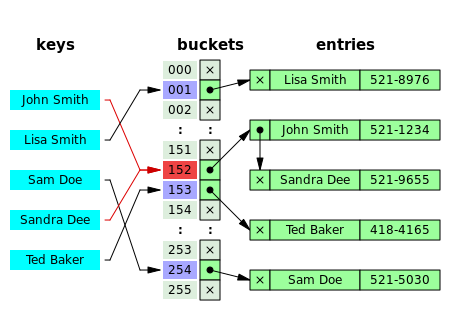Difference between revisions of "Chained Dictionary Assignment"
| Line 117: | Line 117: | ||
=Testing= | =Testing= | ||
| − | <!--{{SMLUnitTest| | + | <!--{{SMLUnitTest|chained_testing|dictionary/single_list_and_hashed}}--> |
| − | file: <code>sml | + | file: <code>sml run_chained_testing.sml</code> |
| − | in folder: <code>src/test/sml/dictionary/ | + | in folder: <code>src/test/sml/dictionary/chained</code> |
=Pledge, Acknowledgments, Citations= | =Pledge, Acknowledgments, Citations= | ||
{{Pledge|studio-dictionary}} | {{Pledge|studio-dictionary}} | ||
Revision as of 15:31, 28 February 2022
Contents
Motivation
In this and the follow up Sorted Dictionary studio, you will build three implementations of a dictionary. Each will be a persistent, mutable data structure, so you can expect to use the ref feature of SML, either directly or via the mutable Array structure.
Background
fun get_value_at_reference(reference : 'a ref) : 'a =
!reference
fun set_value_at_reference(reference : 'a ref, next_value : 'a) : 'a =
let
val previous_value = !reference
val _ = reference := next_value
in
previous_value
end
(* alternate version
fun set_value_at_reference(reference : 'a ref, next_value : 'a) : 'a =
let
val previous_value = !reference
in
( reference := next_value
; previous_value )
end
*)
Dictionary
Signature
signature DICTIONARY = sig
type (''k,'v) dictionary
val get : ((''k,'v) dictionary *''k) -> 'v option
val put : ((''k,'v) dictionary *''k *'v) -> 'v option
val remove : ((''k,'v) dictionary *''k) -> 'v option
val entries : (''k,'v) dictionary -> (''k*'v) list
val keys : (''k,'v) dictionary -> ''k list
val values : (''k,'v) dictionary -> 'v list
end
Spec
get
Behaves much like java.util.Map<K,V>'s get(key) method except instead of returning null or the associated value, it returns an option.
put
Behaves much like java.util.Map<K,V>'s put(key,value) method except instead of returning null or the previously associated value, it returns an option.
remove
Behaves much like java.util.Map<K,V>'s remove(key) method except instead of returning null or the previously associated value, it returns an option.
entries
Behaves much like java.util.Map<K,V>'s entrySet() method.
keys
Behaves much like java.util.Map<K,V>'s keySet() method.
values
Behaves much like java.util.Map<K,V>'s values() method.
DictionaryUtils
All three implementations of dictionary can reuse the same functions which given a list of entries produce the keys and values.
One of List's higher order functions can be useful here. Which one is it?
fun entries_to_keys(entries : (''k*'v) list) : ''k list =
raise NotYetImplemented
fun entries_to_values(entries : (''k*'v) list) : 'v list =
raise NotYetImplemented
HasEntriesFn
functor HasEntriesFn (HasEntriesParameter : sig
type (''k,'v) dictionary
val entries : (''k,'v) dictionary -> (''k*'v) list
end) : HAS_ENTRIES = struct
open HasEntriesParameter
fun keys(dict : (''k,'v) dictionary) : ''k list =
(* <SOLUTION> *)
if true
then
List.map (fn(key,_)=>key) (entries(dict))
else (* </SOLUTION> *)raise Fail "NotYetImplemented"
fun values(dict : (''k,'v) dictionary) : 'v list =
(* <SOLUTION> *)
if true
then
List.map (fn(_,value)=>value) (entries(dict))
else (* </SOLUTION> *)raise Fail "NotYetImplemented"
end
HasChainingFn
functor HasChainingFn (HasChainingParameter : sig
type (''k,'v) dictionary
val getChainOfEntriesForKey : ((''k,'v) dictionary * ''k) -> (''k*'v) list
val setChainOfEntriesForKey : ((''k,'v) dictionary * ''k * (''k*'v) list) -> unit
end) : HAS_CHAINING = struct
open HasChainingParameter
SingleChained Implementation
signature SINGLE_CHAINED_DICTIONARY = sig include DICTIONARY
val create : unit -> (''k,'v) dictionary
end
Hashtable Implementation
signature HASHED_DICTIONARY = sig include DICTIONARY
type ''k hash_function = ''k -> int
val create_hashed : (int * ''k hash_function) -> (''k,'v) dictionary
end
Testing
file: sml run_chained_testing.sml
in folder: src/test/sml/dictionary/chained
Pledge, Acknowledgments, Citations
| file: | studio-dictionary-pledge-acknowledgments-citations.txt |
More info about the Honor Pledge
